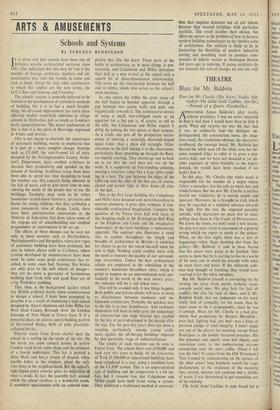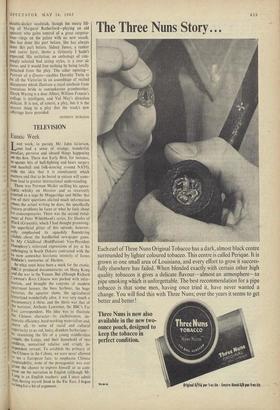THEATRE
Blues for Mr. Baldwin
Blues for Mr. Charlie. (The Actors' Studio, Ald- wych.)—The Solid Gold Cadillac. (Saville.) —Portrait of a Queen. (Vaudeville.) APPROACHING James Baldwin's play totally „ftwithout prejudice, I was no more surprised to find it bad than I would have been to find it good. What did surprise me was the fact that it was so ordinarily bad—the dialogue un- distinguished, the construction loose, the situa- tions stock, the resolutions obvious, the characters cardboard, the message banal. Mr. Baldwin has blasted the white man till the white man has be- come tempted either to rebel or to grow a pro- tective hide, and we were not shocked at yet an- other exposure of white brutality to the negro; instead, we would have been shocked if we hadn't had it.
In this play, Mr. Charlie (the white man) is responsible for the murder of a negro whose father, a preacher, lost his wife to white lust and vindictiveness. But the new Mr. Charlie is neither lustful nor vindictive; he is merely stupid and ignorant. Moreover, he is brought to trial, which may be regarded as a minimal advance towards the light. For the rest, the expected morality unfolds, with characters no more live or com- pelling than those in The Castle of Perseverance. We know the issues, we don't need a new lesson; the play is a mere ritual re-enactment of a general wrong which we regret as much as the author. When, on the first night, there was a sort of happening—white thugs shouting dirt from the gallery—Mr. Baldwin is said to have feared that his actors were going to be lynched. This seems to show that he is starting to live in a world of his own, one in which he actually wills what he most fears and hates. If the. Aldwych audi- ence had thought of lynching, they would have reserved it for the white intruders.
But Mr. Baldwin himself is corrupting me by turning me away from purely aesthetic issues towards social ones. His play fails for lack of conflict, but also for lack of ideas, and if Mr. Baldwin thinks that my judgments on his work imply lack of sympathy for his cause, then he must cease to be a propagandist, since he too is corrupt. Blues for Mr. Charlie is a bad play whose bad production by Burgess Meredith— pace bad, lighting bad, sets bad—was a kind of perverse pledge of total integrity. I won't single out any of the players for mention, except Percy Rodriguez as the doubly bereaved preacher. His fine presence and superb voice lent dignity and conviction even to the embarrassing act-one curtain-line over his son's coffin. (Need I tell you the line? It comes from the Old Testament.) That I ended by concentrating on the aptness of the other actors' long Southern vowels for stage declamation, to the exclusion of the meaning they carried, denotes not cynicism but a dislike of waste. I was determined to get something out of the evening.
The Solid Gold Cadillac is stale bread for a double-decker sandwich, though the meaty fill- ing of Margaret Rutherford—playing an old spinster who gains control of a great corpora- tion—rings on the palate with no new smack. She has done this part before. She has always done this part before. Sidney James, a ranker and tastier layer, shows a virtuosity I hadn't expected. His recitation, an anthology of cun- ningly selected bad acting styles, is a tour de force, and it would lose nothing by being totally detached from the play. The other opening— Portrait of a Queen—enables Dorothy Tutin to be all the Victorias in an assemblage of recited documents which illustrate a royal anabasis from tremulous bride to cantankerous grandmother. Derek Waring is a dear Albert, William Francis's collage is intelligent, and Val May's direction delicate. It is not, of course, a play, but it is the nearest thing to a play that the week's new offerings have provided.
ANTHONY BURGESS



































 Previous page
Previous page